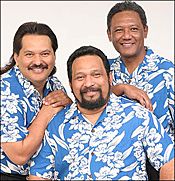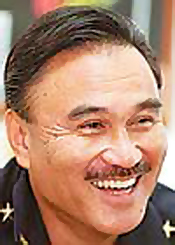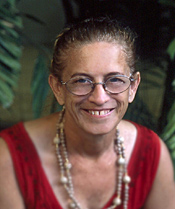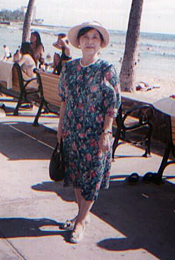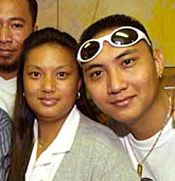Hawai'i International
Forgiveness Day
August 6, 2006

photo by Malou Mallison
Hawai'i Forgiveness Project
Heroes of Forgiveness,
Reconciliation and Peace
2006
|
• Makaha Sons
Moon Kauakahi and siblings, Jerome and John Koko, are members of one of Hawaii’s most popular and beloved musical groups. Celebrating the 30th anniversary of the founding of the group this year, the Makaha Sons have endured and persevered through a musical journey that has experienced its highs and lows, including the parting of their former group member, the late Israel Kamakawiwo’ole, in the early 1990’s. Continuing on with their respective musical interests and recordings, both the Makaha Sons and Israel were somehow destined to be reunited for a spontaneous and unforgettable final public appearance together during the 1996 Na Hoku Hanohano Awards show that was broadcast live to thousands of island homes. The reunion was pure aloha and forgiveness at its essence, opening the hearts of everyone who witnessed it live or on television. During the past several years, hundreds of young people and adults in youth programs and schools statewide have also learned about the power of aloha-forgiveness through viewing a video of the memorable reunion and a lesson plan created by the Conversation on Forgiveness For Youth project. The Makaha Sons continue to perpetuate the Hawaiian culture and aloha through the sharing of their music and creation of the Makaha Sons Foundation which has generously supported a variety of organizations, from helping some of Hawaii’s officers of the police department, families afflicted with illnesses, to providing scholarships each year to a deserving high school graduating senior. Here is more about the Makaha Sons, including a short sample of their music.
Police Chief Michael Nakamura (1947-2006) When the late former Honolulu Police Chief Michael Nakamura was struck by a hit and run driver in 2004, he publicly forgave the driver despite suffering injuries that exacerbated the debilitating neuromuscular condition that afflicted him. The former Police Chief stated: “As Christians, we are supposed to forgive. If anything, I hope he turns his life around.” The driver and his dad later were able to have lunch with Michael. The driver apologized to Michael which helped him to move forward in his life. Mayor Mufi Hannemann, a good friend commented on Michael’s spirit and character: “His forgiveness of the young man who struck him down was an indication of the kind of man Mike Nakamura was.” Honolulu Prosecutor Peter Carlisle remembers Michael: “He was cheerful, he was upbeat. Despite all the physical difficulties he encountered later in his life, I have never seen a man with such a remarkable spirit. He had a kind of gentle courage and humor that came out even under the worst of circumstances.” Here is a press story about Chief Nakamura, and the court case that decided the fate of the driver who hit him.
Diann Boone Diann Boone suffered through an abusive childhood at the hands of a teacher and a priest. For years the painful memories remained within her, repressed by threats of harm if she revealed anything. Later as an adult who was advocating for services for her disabled son, Diann sought support through a group for women that had been sexually assaulted. During the next year with the guidance of a wonderful group counselor Diann came to realize that she had been abused as a child. The process of spending a whole year with a group of courageous women allowed Diann and her group members to come to grips with the anger and the pain that underlined their abuse. One night Diann woke up from a nightmare having a vivid vision of what had transpired as a child. When this happened the true healing was about to begin. Later, telling her parents was the hardest thing Diann had to do as she had to confront her father with the fact that he had been too busy to listen. Diann also felt she needed to protect her parents by not naming the abuser because he had been such a close personal friend of the family and was now deceased. Diann felt at that point she was able to forgive him and this was a way in which she could demonstrate her forgiveness by not hurting his good name with her parents. It seemed that it would serve no purpose to tell them except to cause them pain.
Masago and Tokiko Asai Masago was born in Nagasaki and represents a “second generation” of atomic bomb victims. All of her grandparents have died of cancer. Her father was also a victim of the same disease six years ago. Her mom, Tokiko Asai, had an operation last year to remove her whole stomach but is still surviving, which Masago is grateful for. Tokiko Asai is an example of all of the other war sufferers who have come out from their painful experiences, and successfully made the courageous transition from agony to happiness with the power of acceptance and forgiveness. They are the true role models to look up to: "I call myself a mediator or a communicator who can build a bridge between those who have wisdom and those who are eager to learn their teachings, since I know that I never could imagine the real pain of the sufferers." With a direct experience of the effects of war on her family, Masago asks how we can reach world peace. Masago started to realize that if each one of us knows how to purify our mind and soul no matter what happens in life, our world could be a better place. However, as long as we have negative emotions, we just can’t jump to the “Peace Making Activities” since it may create another conflict reflecting our painful mind. Forgiveness for Masago offers a path towards peace. She said, “As a matter of fact, this event gave me the inspiration to start my own activity under the ‘Aloha Peace Project” as of today. I’m very thankful for being given this opportunity."
Malakai Maumalanga and Jane Tampon Time and forgiveness can heal wounds. Malakai and Jane demonstrate this everyday as co-workers for the Adult Friends for Youth agency. Once part of rival gangs over17 years ago in Kalihi, Malakai and Jane were living a life of fear, threats and criminal behaviors. Jane especially feared for her brother’s life because he was the real gang member who had been initiated into the gang life while she was a target for harassment because of her sibling relationship. Through intense work and caring by dedicated social workers from the Adult Friends for Youth agency, Malakai, Jane and her brother eventually turned away from the gang lifestyle and both Malakai and Jane have chosen to pursue career paths in the human service field. While still employed at the Adult Friends for Youth agency, Malakai received his Bachelor of Social Work degree this past May and is now enrolled in the Masters of Social Work program. His current practicum is at the site of one of his old gang related activities--Farrington High School. Jane is the coordinator for the Student Transition Program for the Adult Friends for Youth agency. Sid Rosen, chief executive officer at Adult Friends for Youth, commented: “Their story of making peace and forgiveness is a wonderful example of what is possible through good social work, despite what may seem to be an impossible situation to the outsider.” |
